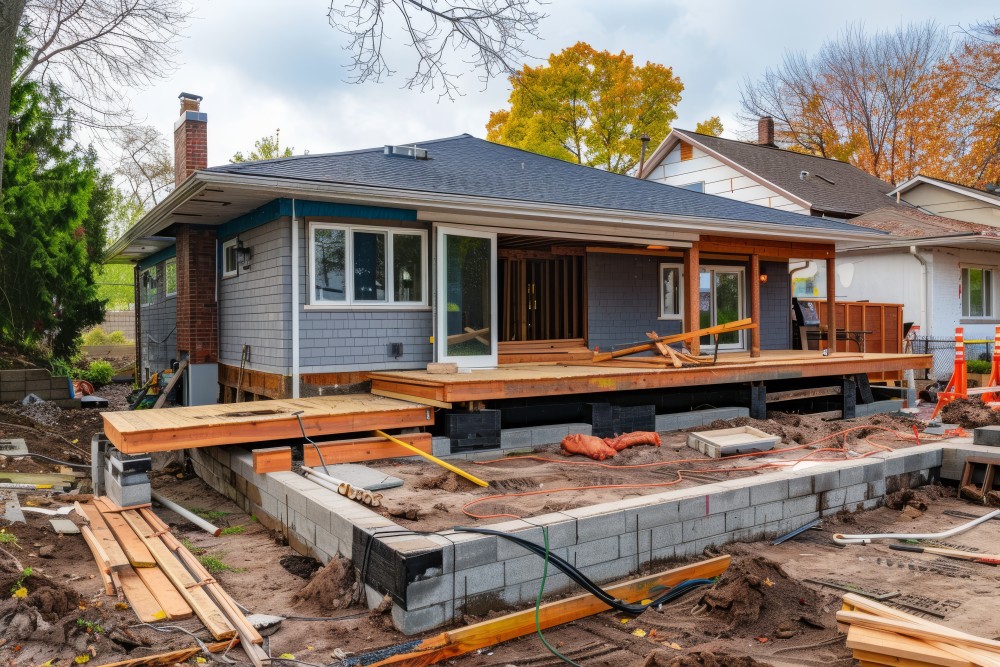1. Plan for the Unexpected
Set Realistic Expectations
- Expect Delays: Understand that delays are common in renovation projects due to various factors like weather, supply shortages, or hidden problems.
- Build Flexibility: Be prepared to adjust your timeline and budget as needed.
Create a Contingency Fund
- Allocate Extra Funds: Set aside 10-20% of your total budget as a contingency fund to cover unexpected costs.
- Avoid Overcommitting: Don’t allocate every penny at the outset. Leave room in your budget for surprises.
2. Conduct Thorough Pre-Renovation Inspections
Hire Professionals for Inspections
- Home Inspectors: Get a detailed inspection from a licensed home inspector to identify potential issues before starting.
- Specialized Experts: Consider hiring specialized experts like structural engineers, electricians, or plumbers for a more in-depth analysis.
Address Known Issues First
- Prioritize Repairs: Address any known issues identified during inspections before starting your renovation. This can help prevent further complications down the line.
Join HICP Homeowner’s Alliance
Connect with experts, get special discounts and enjoy member benefits
3. Communicate Clearly with Your Contractor
Establish Open Communication
- Regular Updates: Schedule regular meetings with your contractor to discuss progress and any emerging issues.
- Clear Instructions: Ensure your contractor understands your expectations and keeps you informed about any changes or problems.
Document Everything
- Written Agreements: Document all agreements, changes, and communications in writing to avoid misunderstandings.
- Change Orders: Use formal change orders for any modifications to the original plan, including costs and timelines.
4. Stay Flexible and Adaptable
Be Ready to Make Decisions
- Quick Decisions: Be prepared to make quick decisions when unforeseen issues arise to keep the project moving.
- Informed Choices: Gather all necessary information before making decisions, considering both immediate and long-term impacts.
Adjust Your Plans
- Alternate Solutions: Have backup plans and be willing to adapt your original design to accommodate unexpected problems.
- Prioritize Needs: Focus on essential aspects of the renovation first and be willing to compromise on less critical features if needed.
5. Manage Budget Adjustments
Track Expenses Closely
- Monitor Spending: Keep a close eye on your budget throughout the renovation, tracking all expenses and comparing them to your initial estimates.
- Adjust Budget: Reallocate funds as needed from the contingency fund to cover unexpected costs without overspending.
Avoid Cutting Corners
- Quality Over Cost: Don’t compromise on quality to save money in the short term. Cutting corners can lead to more significant problems and expenses later.
- Plan B: Consider cheaper but still quality alternatives if necessary, rather than opting for the cheapest solution available.
6. Maintain a Positive Attitude
Stay Calm and Patient
- Expect Stress: Understand that stress and frustration are part of the renovation process. Stay calm and patient when issues arise.
- Focus on Solutions: Rather than dwelling on the problem, focus on finding a solution and moving forward.
Celebrate Progress
- Small Wins: Celebrate small milestones and progress to stay motivated and positive throughout the project.
- Visualize the Outcome: Keep the end goal in mind and visualize the completed project to stay motivated.
7. Know When to Seek Help
Consult Professionals
- Specialized Help: If you encounter a problem beyond your expertise, don’t hesitate to seek help from professionals.
- Second Opinions: Get a second opinion if you’re unsure about a proposed solution or if the issue is particularly complex.
Legal and Financial Advice
- Contracts and Disputes: Consult a legal professional if you encounter contractual disputes or significant legal issues.
- Budget Overruns: Seek financial advice if your budget is significantly impacted by unforeseen issues.
Conclusion
Dealing with unforeseen issues during a home renovation can be challenging, but with the right approach, you can navigate these obstacles successfully. By planning for the unexpected, conducting thorough inspections, maintaining clear communication with your contractor, and staying flexible, you can manage surprises effectively. Track your budget closely, maintain a positive attitude, and seek professional help when needed. With these strategies, you can handle unforeseen issues confidently and keep your renovation project on track, ultimately achieving a successful and satisfying result.



















